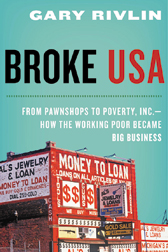This article is from Dollars & Sense: Real World Economics, available at http://www.dollarsandsense.org

This article is from the January/February 2011 issue of Dollars & Sense magazine.
Subscribe Now
at a 30% discount.

Goin’ for Broke
A review of Broke, USA by Gary Rivlin (New York: HarperCollins, 2010).Gary Rivlin’s illuminating but uneven book introduces us to dozens of people who make money by lending to the poor, and to others who battle these predatory lenders.
Their stories come from dozens of interviews conducted by the author and revolve around six industries—check-cashing outlets, rent-to-own shops, pawnbrokers, payday loan stores, tax preparers offering tax refund advances, and subprime mortgage lenders. Collectively, these industries make $150 billion in revenue per year; an average low-income family spends $3,800 annually on their services, around 15% of its meager income.
Many of the individual stories are gripping and reveal the inner workings of businesses that lend to the poor. They clearly show how the enormous rewards from predatory lending inevitably lead to exploitation of the poor.
But focusing on individual tales makes for a difficult storyline to follow. Like Pirandello’s Six Characters in Search of Author, they need some direction. The tragedy of Broke, USA is that too many good stories get lost because of the poetic license Rivlin takes—the plot continually jumps without rhyme or reason. Compounding this problem are several tangential and one-dimensional characters, people who contribute little to our knowledge of “the poverty industry.”
The better stories—because they contain a richer plot and more complex characters—involve crusaders for the poor. Through the efforts of anti-payday-loan crusader Bill Faith, Rivlin explains, Ohio came to approve an interest rate cap on all loans. He also tells us how anti-predatory-loan crusader Martin Eakes struggled to start the Center for Community Self-Help in North Carolina. With a $50 million Ford Foundation grant, this non-profit pioneered mortgage-backed securities and subprime mortgages as a way for low-income families to own homes. Walking a fine line, Eakes nonetheless opposed subprime lending by predatory commercial firms.
My favorite character is Chris Browning, who managed a payday loan outlet in Mansfield, Ohio. Her $21,000 salary was supplemented by bonuses of up to $6,000. This extra money meant the difference between scraping by and a comfortable lifestyle. Her store generated annual profits of nearly $250,000 for its owner. Here was someone struggling, Hamlet-like, to balance her needs, the plight of the poor, and a desire to help those in immediate need. More importantly, her financial concerns had to be balanced against pressures from the store owner, who wanted Chris to call former clients and press them (against their own interests) to take out more payday loans.
Taken as a whole, Rivlin’s stories suffer from some noteworthy omissions. Their focus is almost always on the lenders; borrowers remain bit players. Additional stories about the victims would have made for a more powerful indictment of the predators and highlighted the many reasons the poor take out high-interest loans.
Another missing element is a conclusion to this morality play. A few lessons stand out in my mind. As Bill Faith’s story shows, interest rate caps are needed, and all loan fees and expenses must be included under this cap. Even Adam Smith, the father of free market economics, supported usury laws as a way to prevent exploitation of the poor. In some of his more moving scenes, Rivlin describes how the poor scramble to get their tax refunds (mainly as a result of the Earned Income Tax Credit) as early as possible, and wind up paying usurious interest rates on their loans. If you follow the money here, the Earned Income Tax Credit begins to look like a government subsidy to predatory lenders. An obvious solution would be to ensure that the credit gets paid to workers in each regular paycheck, the same way payroll taxes get deducted. This would also reduce the need for payday loans by low-wage earners.
According to an old adage, “If it ain’t broke, don’t fix it.” In light of Rivlin’s book, it looks like we need an addendum to this: “If it breaks others, then break it.” Despite its flaws, Broke, USA makes a clear case that the poverty industry is morally bankrupt and needs to be put down.
Did you find this article useful? Please consider supporting our work by donating or subscribing.
